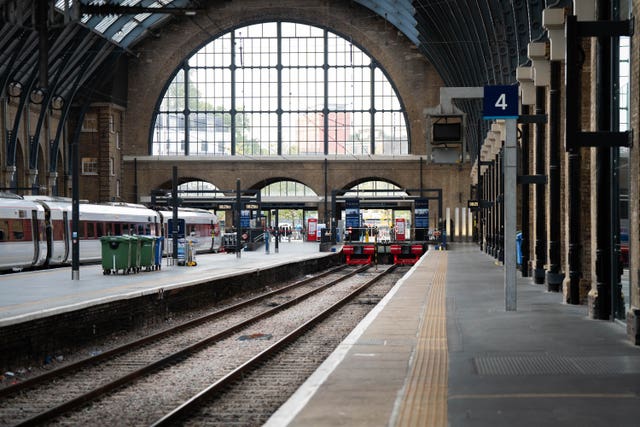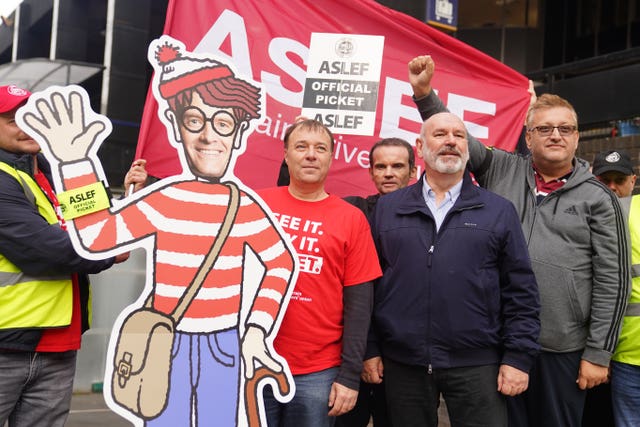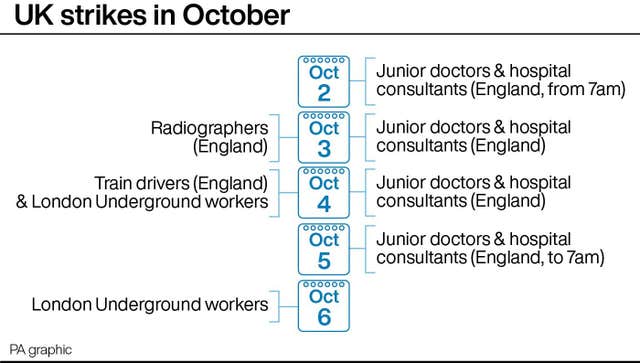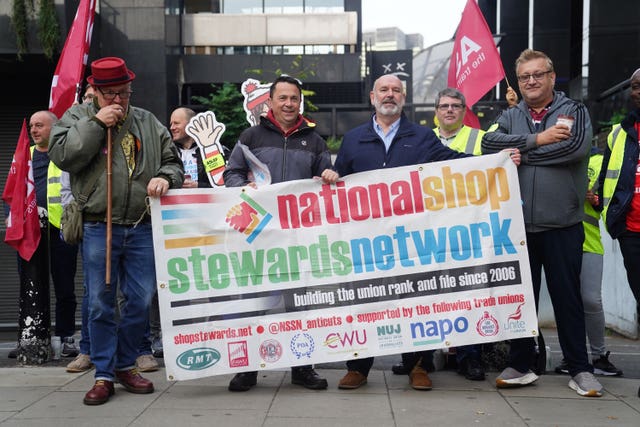The long-running train drivers’ dispute looks set to continue into the new year as passengers suffered fresh travel misery on Wednesday because of another strike.
Members of the drivers’ union Aslef at 16 train operators in England walked out, coinciding with the final day of the annual conference of the Conservative Party in Manchester.
It was the 14th strike since the pay and conditions dispute flared more than a year ago, leading to picket lines being mounted outside railway stations across England.
Many parts of the country had no services all day, including Avanti West Coast, CrossCountry, Northern, Southeastern and TransPennine Express.
Aslef’s general secretary Mick Whelan continued to blame the Government for the stand-off.
Speaking at a picket line outside London’s Euston station, he said: “We don’t have a problem in Scotland. We don’t have a problem in Wales.

“We don’t have a problem in freight or Eurostar or with all the other companies. It is a Westminster political problem caused by Westminster.”
Mr Whelan said support for the latest strike was “solid” and maintained that many Aslef members wanted to go “harder and faster” because so little progress has been made for months.
No more strikes have been announced, but more industrial action could be held in the busy festive period, or even into the new year, if the deadlock is not broken soon.
Mr Whelan joined striking workers who had brought a life-sized cut-out of the Where’s Wally? cartoon character with Transport Secretary Mark Harper’s face imposed on it.

He said: “What we are seeing from the Tory conference is the managed decline of our railways.
“We are striking today because we still haven’t seen the transport minister or the companies for the best part of six months.
“The mood of the train drivers in the UK is that we will keep striking until we get a resolution that suits them.”
Drivers are also banning overtime this week which will also cause disruption.
The union said train companies have always failed to employ enough drivers to provide a proper service.
A spokesperson for the Rail Delivery Group said: “There is a deal on the table for Aslef that would take average driver salaries to £65,000 for a four-day week – that’s more than double the average UK salary and many drivers top up their income further by working overtime.

“We are ready and willing to talk to Aslef’s leaders so we can end this damaging dispute – but any talks about pay also need to address working practices that date back decades.
“The industry depends on a monthly injection of up to £175 million from the taxpayer because revenues are still 30% below pre-pandemic levels – while simultaneously facing unprecedented changes in customer travel patterns.
“This isn’t just costing taxpayers, it’s costing businesses eye-watering sums, and all because Aslef’s leadership refuse to discuss much-needed changes to ways of working.
“It is obvious that the sector can only fund a pay rise by changing how it delivers services so it can respond to that transformation in how the public use the railway.
“That means putting managers – rather than unions – in charge of planning shifts. It means allowing managers to respond to unexpected staff absences so they can reduce the last-minute cancellations that so frustrate our customers.
“It means giving our customers more reliable train services when they actually want to use them – particularly on Sundays. That is how any industry survives and thrives.”

A Department for Transport spokesperson said: “The Government spent £31 billion of taxpayers’ money – £1,000 per household – to protect rail workers’ jobs during the pandemic.
“There is a fair and reasonable offer on the table that would take train drivers’ salaries from £60,000 to £65,000 for a 35-hour, four-day week.
“Aslef’s leaders won’t put this offer to their members and instead continue to strike, damaging their own industry in the process.”
